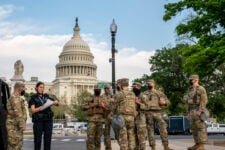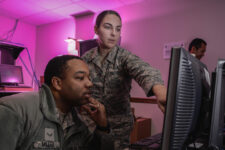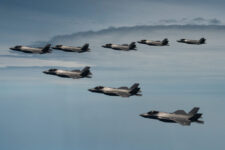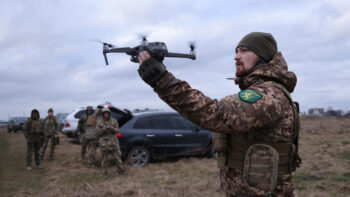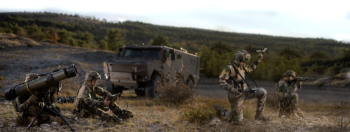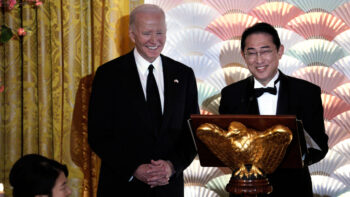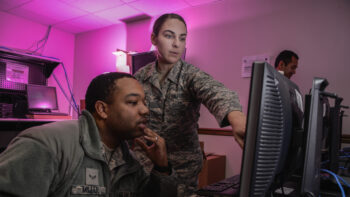
The Pentagon is establishing a new team to examine the Pentagon’s biodefense plans. (US Army/Sgt. 1st Class Marisol Walker)
WASHINGTON — With an eye towards the proliferation of biodefense threats and being ready when a future emergency crops up, the Pentagon’s new Biodefense Council will be tasked with breaking down internal stovepipes, and streamlining responses and acquisition plans, according to senior Pentagon officials.
The Department of Defense (DoD) released its first BioDefense Posture Review earlier this month designed to capture lessons from the COVID-19 pandemic response and align itself to operate more effectively during future bioincidents. One of the main takeaways is the desire to streamline efforts across the department — through mechanisms like the council.
“The department had a fundamental governance problem,” Deborah Rosenblum, the assistant secretary of defense for Nuclear, Chemical, and Biological Defense Programs told an audience today during a Center for Strategic and International Studies event. “There’s a lot of very good work being done across… stovepiped centers of excellence. But as you move up into the senior leadership, there [is] not an awareness, nor an ability to make decisions across the enterprise of the department and that is a fundamental problem.”
The new council is being billed as a way to break down those barriers and will be helmed by Undersecretary of Defense for Acquisition and Sustainment Bill LaPlante, with Rosenblum serving as the first executive secretary. Other members will include DoD’s Undersecretary for Policy, along with representatives from the services, US Northern Command and US Special Operations Command.
“Whenever there is a response, the council will have all of the OSD [Office of the Secretary of Defense] elements engaged — the Joint Staff, combatant commands and the services,” added Brandi Vann, principal deputy assistant secretary of defense for Nuclear, Chemical, and Biological Defense Programs. “All of those components that might… play a part in a global response or a targeted response, will all come together in this council moving forward.”
The report notes that the council will also be tasked with identifying and developing “appropriate and regular mechanisms” to enhance intelligence sharing across the DoD, within the US government, and with allies and partners to support biodefense activities.
It will also be tasked with aligning research, development, and acquisition activities and portfolios across the “entire biothreat spectrum.” That entire spectrum, according to the report, includes:
- Naturally occurring biological threats like the COVID-19 pandemic;
- Accidental biological threats such as laboratory accident; and
- Deliberate biological threats to include the use of biological weapons and their proliferation.
On that latter point, the report notes that China, Russia, North Korea, and Iran— all Biological Weapons and Toxins Convention signatories — “probably maintain the knowledge and capability” to produce and employ pathogens and toxins.
“The United States assesses that North Korea and Russia maintain offensive biological weapons programs in violation of Biological Weapons and Toxins Convention (BWC) obligations and identifies concerns with Iran’s activities and its compliance with the BWC,” the DoD report said.
“Additionally, the most recent Compliance and Adherence Report with Arms Control, Nonproliferation, and Disarmament Agreements and Commitments raises concerns with [the People’s Republic of China] PRC compliance with the BWC, based on research and activities with potential dual-use applications,” it later adds. The US is specifically concerned with China’s military medical institutions’ toxin research and development.
During today’s event, Asha George, the executive director at Bipartisan Commission on Biodefense, said offensive biological weapons programs will have a ripple effect, and DoD must be prepared.
“It would be foolish for us to think that just these four countries have decided they’re getting involved and that’s it, there’s nobody else, just these four,” George told the audience. “That doesn’t make sense from a proliferation standpoint, both in terms of the proliferation of weapons, and the proliferation of science and quite frankly, the proliferation of fear.”
Neighboring countries will begin to pay more attention and potentially establish defensive programs, or even offensive ones, depending on the country’s military strategy.
“We have to be concerned about other countries jumping in and trying to develop or obtain biological weapons as well,” George added.
Wittman: Pentagon needs to ‘narrow the scope’ of CJADC2
“I think the Pentagon can do this, [but] I think they’re understanding that they do have to scope this down,” Rep. Rob Wittman said about the Pentagon’s CJADC2 effort.


